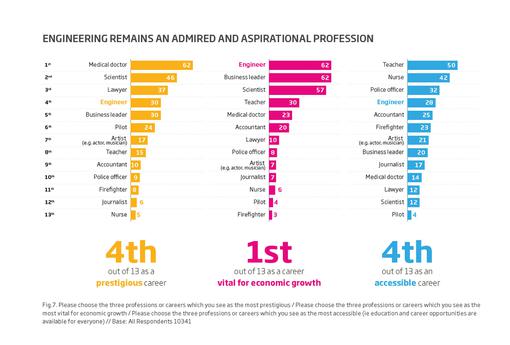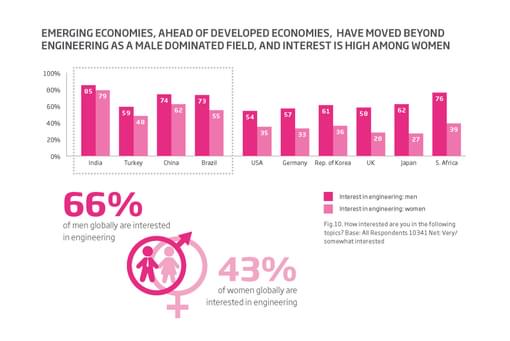Recognising and understanding engineering

Categories: Transport
On Monday 26th October, we released a report on perceptions of engineering across the world. Here are some key points from Chapter 2: Recognising and understanding engineering.
A career in engineering is well regarded. Compared to 12 other professions in each of the 10 countries surveyed - including business leader, lawyer, doctor and teacher - a career in engineering is seen as 1st out of 13 as vital for economic growth, 4th for prestigious, and 4th for accessible. However, many feel engineering is undervalued, with seven in ten people claiming that their country’s engineers do not receive the recognition they deserve for their contribution to society. This may be causing interest levels among would-be recruits to lag behind the more general science roles.

93% agree that engineers are intelligent, logical and fact-based, good at maths, or creative. Paul Westbury CBE, Group Technical Director for Laing O’Rourke UK, notes that “engineers are increasingly seen as smart, creative and sociable people who are well connected to the world around them; a welcome shift from the dated stereotypes of the past!”While many of the myths surrounding engineering are dying out, the way people view the sector remains subject to significant cultural variation. In countries that have recently experienced rapid economic growth, such as India and China, interest in the profession is strong and spread relatively evenly across men and women. In more established economies, such as the UK, USA and Germany, an engineering career appeals to fewer people, the vast majority of whom are male. Professor Viola Vogel, Head of the ETH Laboratory of Applied Mechanobiology, points out that, despite more equal access to education, women in the USA, Germany, Japan, and South Korea show less interest in an engineering career: “Access to education might thus not be the major driver for women to decide against engineering, but the overall society perception of engineering as a discipline might be a key barrier... In India where women of the emerging middle class are increasingly fighting for equal rights, only 29% of the population consider engineering as masculine, while an amazing 30% consider it as feminine. This is the second most surprising finding since India, therefore, has by far the most gender-balanced view toward the attractiveness of engineering in comparison to all of the other countries.” Professor Reinhard Huettl, president of Germany’s National Academy of Science and Engineering, adds that “we have to point out that science and engineering provide the means to reconcile responsibility with good career opportunities... And we have to develop the literacy of our societies in science and engineering.”

Businesses have a stake in this outreach; Steve Holliday, Chief Executive of National Grid writes, “I firmly believe that our continued success as a company - and as a society - depends on the bright, inquisitive minds of the engineers, scientists and technicians of tomorrow.” Nigel Whitehead, Group Managing Director of BAE Systems, urges us to “be bolder about the importance of STEM subjects.” And Narayana Murthy, Founder of Infosys, notes that change can be real and widespread: “Engineers can have an even greater impact on the world of tomorrow than they have had on the one of today.” To truly harness the potential of future engineers, it is vital the sector finds ways to make it both desirable and accessible to all. Professor Dame Ann Dowling DBE, President of the Royal Academy of Engineering writes, “Engineering is a rich, diverse career that allows people to make a real difference to society… Showcasing the creative, collaborative and team-based sides of engineering work ... undermines dated stereotypes of what an engineer is.”



